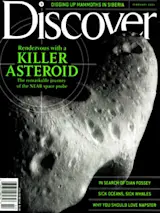Like everyone else, Carla Shatz once had a head full of immature neurons. Somehow those latent cells wired themselves into the fantastically organized complexity of the adult brain. When and how did it happen? Shatz, the first woman to chair Harvard's prestigious department of neurobiology, has spent almost three decades delving into these questions. She shared her answers with Discover Associate Editor Josie Glausiusz.
How do you investigate the brain's early, formative stages? We study is how the eye connects up with the brain during development. We use that as a model for trying to understand how brain wiring is accomplished by the nervous system. There are something like a million nerve cells in the eye that can map to about two million nerve cells in the visual part of the brain. How do they decide which of those two million target nerve cells they should connect up with? Initially ...














